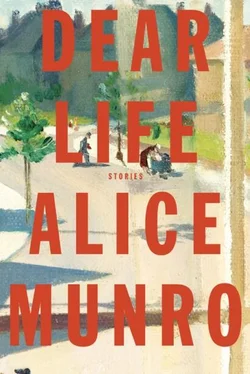“You thought you were too smart,” was what he might have given as his reason for the punishments, and indeed you heard that often in those times, with the smartness figuring as an obnoxious imp that had to have the sass beaten out of him. Otherwise there was the risk of him growing up thinking he was smart. Or her, as the case might be.
However, on that breaking morning he gave me just what I needed to hear and what I was even to forget about soon enough.
I have thought that he was maybe in his better work clothes because he had a morning appointment to go to the bank, to learn, not to his surprise, that there was no extension to his loan. He had worked as hard as he could but the market was not going to turn around and he had to find a new way of supporting us and paying off what we owed at the same time. Or he may have found out that there was a name for my mother’s shakiness and that it was not going to stop. Or that he was in love with an impossible woman.
Never mind. From then on I could sleep.
WHEN my mother was growing up, she and her whole family would go to dances. These would be held in the schoolhouse, or sometimes in a farmhouse with a big enough front room. Young and old would be in attendance. Someone would play the piano—the household piano or the one in the school—and someone would have brought a violin. The square dancing had complicated patterns or steps, which a person known for a special facility would call out at the top of his voice (it was always a man) and in a strange desperate sort of haste which was of no use at all unless you knew the dance already. As everybody did, having learned them all by the time they were ten or twelve years old.
Married now, with three of us children, my mother was still of an age and temperament to enjoy such dances if she had lived in the true countryside where they were still going on. She would have enjoyed too the round dancing performed by couples, which was supplanting the old style to a certain extent. But she was in an odd situation. We were. Our family was out of town but not really in the country.
My father, who was much better liked than my mother, was a man who believed in taking whatever you were dealt. Not so my mother. She had risen from her farm girl’s life to become a schoolteacher, but this was not enough, it had not given her the position she would have liked, or the friends she would have liked to have in town. She was living in the wrong place and had not enough money, but she was not equipped anyway. She could play euchre but not bridge. She was affronted by the sight of a woman smoking. I think people found her pushy and overly grammatical. She said things like “readily” and “indeed so.” She sounded as if she had grown up in some strange family who always talked that way. And she hadn’t. They didn’t. Out on their farms, my aunts and uncles talked the way everybody else did. And they didn’t like my mother very much, either.
I don’t mean that she spent all her time wishing that things weren’t as they were. Like any other woman with washtubs to haul into the kitchen and no running water and a need to spend most of the summer preparing food to be eaten in the winter, she was kept busy. She couldn’t even devote as much time as she otherwise would have done in being disappointed with me, wondering why I was not bringing the right kind of friends, or any friends at all, home from the town school. Or why I was shying away from Sunday School recitations, something I used to make a grab at. And why I came home with the ringlets torn out of my hair—a desecration I had managed even before I got to school, because nobody else wore their hair the way she fixed mine. Or indeed why I had learned to blank out even the prodigious memory I once had for reciting poetry, refusing to use it ever again for showing off.
But I am not always full of sulks and disputes. Not yet. Here I am when about ten years old, all eager to dress up and accompany my mother to a dance.
The dance was being held in one of the altogether decent but not prosperous-looking houses on our road. A large wooden house inhabited by people I knew nothing about, except that the husband worked in the foundry, even though he was old enough to be my grandfather. You didn’t quit the foundry then, you worked as long as you could and tried to save up money for when you couldn’t. It was a disgrace, even in the middle of what I later learned to call the Great Depression, to find yourself having to go on the Old Age Pension. It was a disgrace for your grown children to allow it, no matter what straits they were in themselves.
Some questions come to mind now that didn’t then.
Were the people who lived in the house giving this dance simply in order to create some festivity? Or were they charging money? They might have found themselves in difficulties, even if the man had a job. Doctor’s bills. I knew how dreadfully that could fall upon a family. My little sister was delicate, as people said, and her tonsils had already been removed. My brother and I suffered spectacular bronchitis every winter, resulting in doctor’s visits. Doctors cost money.
The other thing I might have wondered about was why I should have been chosen to accompany my mother, instead of my father doing that. But it really isn’t such a puzzle. My father maybe didn’t like to dance, and my mother did. Also, there were two small children to be looked after at home, and I wasn’t old enough yet to do that. I can’t remember my parents ever hiring a babysitter. I’m not sure the term was even familiar in those days. When I was in my teens I found employment that way, but times had changed by then.
We were dressed up. At the country dances my mother remembered, there was never any appearance in those sassy square dance outfits you would see later on television. Everybody wore their best, and not to do so—to appear in anything like those frills and neckerchieves that were the supposed attire of country folk—would have been an insult to the hosts and everybody else. I wore a dress my mother had made for me, of soft winter wool. The skirt was pink and the top yellow, with a heart of the pink wool sewn where my left breast would be one day. My hair was combed and moistened and shaped into those long fat sausage-like ringlets that I got rid of every day on the way to school. I had complained about wearing them to the dance on the grounds that nobody else wore them. My mother’s retort was that nobody else was so lucky. I dropped the complaint because I wanted to go so much, or perhaps because I thought that nobody from school would be at the dance so it didn’t matter. It was the ridicule of my school fellows that I feared always.
My mother’s dress was not homemade. It was her best, too elegant for church and too festive for a funeral, and so hardly ever worn. It was made of black velvet, with sleeves to the elbows, and a high neckline. The wonderful thing about it was a proliferation of tiny beads, gold and silver and various colors, sewn all over the bodice and catching the light, changing whenever she moved or only breathed. She had braided her hair, which was still mostly black, then pinned it in a tight coronet on top of her head. If she had been anybody else but my mother I would have thought her thrillingly handsome. I think I did find her so, but as soon as we got into the strange house I had to notice that her best dress was nothing like any other woman’s dress, though they must have put on their best too.
The other women I’m speaking of were in the kitchen. That was where we stopped and looked at things set out on a big table. All sorts of tarts and cookies and pies and cakes. And my mother too set down some fancy thing she had made and started to fuss around to make it look better. She commented on how mouthwatering everything looked.
Читать дальше












